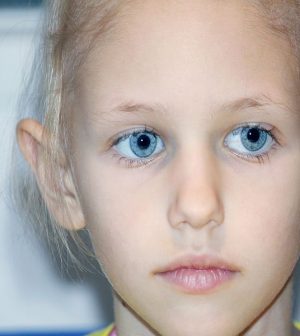- Could Your Grocery Store Meat Be Causing Recurring UTIs?
- Are You Making This Expensive Thermostat Error This Winter?
- Recognizing the Signs of Hypothyroidism
- 10 Strategies to Overcome Insomnia
- Could Artificial Sweeteners Be Aging the Brain Faster?
- Techniques for Soothing Your Nervous System
- Does the Water in Your House Smell Funny? Here’s Why
- Can a Daily Dose of Apple Cider Vinegar Actually Aid Weight Loss?
- 6 Health Beverages That Can Actually Spike Your Blood Sugar
- Treatment Options for Social Anxiety Disorder
Cancer Drug Helps Some Kids With Rare Type of Leukemia

The cancer drug dasatinib shows promise in treating children with chronic myeloid leukemia (CML) caused by the gene BCR-ABL, also known as the Philadelphia chromosome, researchers report.
“Despite the fact that there is a common molecular driver — BCR-ABL — for this disease in adults and in children, the manifestation in children is different. Pediatric patients tend to have more aggressive disease,” said study senior author Dr. Lia Gore.
She is co-director of the University of Colorado Cancer Center’s Hematological Malignancies Program.
“What we saw from the patients we enrolled at Children’s Hospital Colorado and around the world was that patients had great disease control, minimal toxicities and were really able to move into normal activities, a normal daily life,” Gore said in a university news release.
“One of our long-term patients is in college now and is studying to go on to nursing school as a result of her experience,” Gore added.
Chronic myeloid leukemia accounts for 5 percent of all childhood leukemias, with about 150 cases a year in the United States.
Most cancers, including CML, are more common in adults, so it can be hard to enroll enough pediatric cancer patients in a clinical trial, Gore noted. This latest trial is the largest prospective trial of pediatric patients with CML, conducted at 80 medical centers in 18 countries, she said.
Of the 113 child patients in the phase 2 clinical trial, 75 percent of those who had previously failed or could not tolerate an older drug called imatinib (Gleevec) had progression-free survival 48 months after starting treatment with dasatinib (Sprycel).
Among newly diagnosed patients and previously untreated patients, more than 90 percent had progression-free survival at 48 months of treatment, the study authors said.
The study was to be presented Monday at the annual meeting of the American Society for Clinical Oncology, in Chicago. Research presented at meetings should be viewed as preliminary until published in a peer-reviewed journal.
More information
The U.S. National Cancer Institute has more on chronic myeloid leukemia.
Source: HealthDay
Copyright © 2026 HealthDay. All rights reserved.










